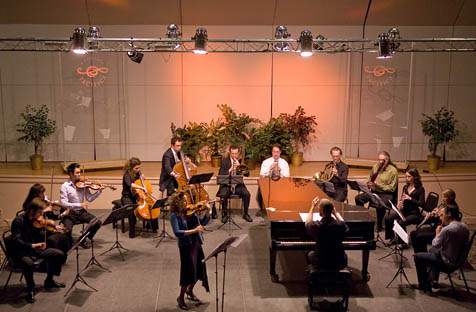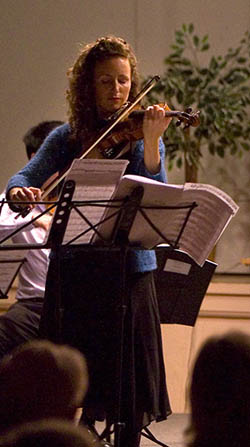Camerata Pacifica’s May Concert.
At Abravanel Hall, Music
Academy of the West.
Regeneration

The concerto gives us the heroic image of a single player, bravely making a musical statement with a huge orchestra behind and an even bigger audience in front. On Friday night, Catherine Leonard gave this image new meaning when she performed the premiere of Ian Wilson’s “Messenger” Concerto for Violin and Chamber Ensemble. Not only did she play brilliantly, but the music’s own imagery-that of a frightened family anticipating, and then fleeing, the NATO bombardment of Belgrade in 1999-came through in vivid colors. Wilson wrote the first movement of the concerto in the days leading up to the bombing, the second movement just after the birth of his son, and the third and fourth after the Wilson family had fled to Northern Ireland.

The first movement began coherently, with clear melodies and ominous rumblings which then gave way to nearly hysterical fear. In contrast, the lullaby in the second movement didn’t become clear until the end; it’s then that you recognize the terrified parents calming their newborn son. The third movement was full of drive and industry, but the fourth brought back the memory of the destroyed city they left behind. The violin and piano kept returning to a single note (a high B) over and over again, making a sound like a cardiac monitor when the patient flatlines.
After the intermission, the ensemble gave us a cool, cerebral break from all the emotion with Stravinsky’s Septet, a short work using Baroque forms in the style of J.S. Bach. In his introduction to the piece, bassoonist John Steinmetz challenged us to “figure out what’s going on in the last movement” when the almost mathematically precise gigue dance form nearly turns to chaos, then resolves. It’s not so mysterious-in the 20th century, not the 17th, a moment of clarity in the midst of confusion may be the best we can hope for.
The final performance of the evening, Copland’s Appalachian Spring, illustrates the point well. This piece tells the story of a young couple who receive the wisdom of their friends, neighbors, and clergy as they prepare for marriage. When heard in context, the five variations on the Shaker melody “Simple Gifts” avoid cliche and sentimentality, revealing the strangeness beneath American rural life while preserving its beauty. Congratulations to Adrian Spence and Camerata Pacifica on a brilliant finale and a magnificent season.



